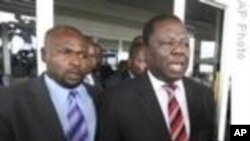Opposition leader Morgan Tsvangirai announced he will join Zimbabwe President Robert Mugabe in a coalition government, a move that would end a 10-month standoff and hopefully clear the way for the long-time rivals to work together to address the nation’s serious political and humanitarian crisis.
Mr. Mugabe has repeatedly proven that he shares power begrudgingly if at all, however; so only time will tell if the deal means a new day for the troubled Southern African nation.
Mr. Tsvangirai’s decision followed a summit meeting of Southern African leaders, who helped organize the negotiations and will oversee the accord's implementation to ensure that government ministries and other key posts are divided fairly between Mr. Mugabe’s Zimbabwe African National Union–Patriotic Front party and the Movement for Democratic Change, or MDC, led by Mr. Tsvangirai.
MDC won a majority in parliamentary elections last March and Mr. Tsvangirai garnered the most votes in the presidential election. Nevertheless, the government has been in stalemate since Mr. Mugabe won an internationally disputed runoff Mr. Tsvangirai refused to take part in, due to government-sponsored violence against his supporters.
Meanwhile, Zimbabwe’s epic inflation reached record levels ruining the nation’s already fragile economy; food shortages reached famine proportions, and a cholera outbreak that began in August has flared into a national and regional epidemic claiming more than 3,700 lives in Zimbabwe and dozens more in neighboring countries.
U.S. President Barack Obama has reached out to Zimbabwe’s neighbors, urging them to step up their involvement in helping Zimbabwe deal with its crises. The U.S. has increased targeted sanctions against leaders and supporters of the Mugabe regime in response to last summer's sham runoff election.
While these have had an impact, it's clear that change in Zimbabwe is unlikely without African leaders taking action to ensure Mr. Mugabe shares power in an inclusive fashion. This should include a thorough and even-handed division of key government ministries between the parties, so the new government operates as a true coalition.
As the political process plays out, the U.S. will continue working with other members of the international community to address Zimbabwe’s humanitarian needs. To check the spread of cholera there, the U.S. Agency for International Development has provided more than $10 million in recent months. Significant food and other humanitarian aid are also being provided to the millions of Zimbabweans who need this assistance until the next harvest in April.
Mr. Mugabe has repeatedly proven that he shares power begrudgingly if at all, however; so only time will tell if the deal means a new day for the troubled Southern African nation.
Mr. Tsvangirai’s decision followed a summit meeting of Southern African leaders, who helped organize the negotiations and will oversee the accord's implementation to ensure that government ministries and other key posts are divided fairly between Mr. Mugabe’s Zimbabwe African National Union–Patriotic Front party and the Movement for Democratic Change, or MDC, led by Mr. Tsvangirai.
MDC won a majority in parliamentary elections last March and Mr. Tsvangirai garnered the most votes in the presidential election. Nevertheless, the government has been in stalemate since Mr. Mugabe won an internationally disputed runoff Mr. Tsvangirai refused to take part in, due to government-sponsored violence against his supporters.
Meanwhile, Zimbabwe’s epic inflation reached record levels ruining the nation’s already fragile economy; food shortages reached famine proportions, and a cholera outbreak that began in August has flared into a national and regional epidemic claiming more than 3,700 lives in Zimbabwe and dozens more in neighboring countries.
U.S. President Barack Obama has reached out to Zimbabwe’s neighbors, urging them to step up their involvement in helping Zimbabwe deal with its crises. The U.S. has increased targeted sanctions against leaders and supporters of the Mugabe regime in response to last summer's sham runoff election.
While these have had an impact, it's clear that change in Zimbabwe is unlikely without African leaders taking action to ensure Mr. Mugabe shares power in an inclusive fashion. This should include a thorough and even-handed division of key government ministries between the parties, so the new government operates as a true coalition.
As the political process plays out, the U.S. will continue working with other members of the international community to address Zimbabwe’s humanitarian needs. To check the spread of cholera there, the U.S. Agency for International Development has provided more than $10 million in recent months. Significant food and other humanitarian aid are also being provided to the millions of Zimbabweans who need this assistance until the next harvest in April.













